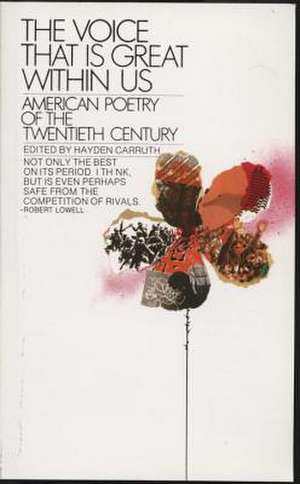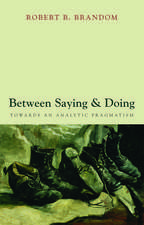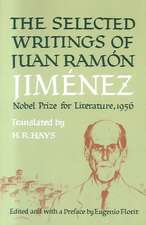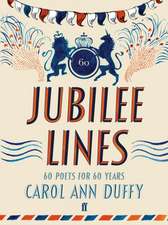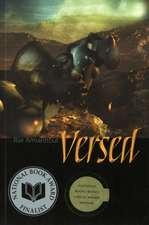The Voice That Is Great Within Us: American Poetry of the Twentieth Century: Bantam Classics
Autor Hayden Carruthen Limba Engleză Paperback – 31 aug 1983
This famous anthology includes the works of more than 130 major American poets of the modern period-Robert Frost, Paul Goodman, Carl Sandburg, T.S. Eliot, Ezra Pound, Allen Ginsberg, and Gwendolyn Brooks among them-along with short biographies of each.
"Not only the best on its period, I think, but is even perhaps safe from the competition of rivals."-Robert Lowell
Din seria Bantam Classics
-
 Preț: 39.98 lei
Preț: 39.98 lei -
 Preț: 35.46 lei
Preț: 35.46 lei -
 Preț: 32.91 lei
Preț: 32.91 lei -
 Preț: 33.77 lei
Preț: 33.77 lei -
 Preț: 29.86 lei
Preț: 29.86 lei -
 Preț: 32.09 lei
Preț: 32.09 lei -
 Preț: 34.03 lei
Preț: 34.03 lei -
 Preț: 36.91 lei
Preț: 36.91 lei -
 Preț: 31.42 lei
Preț: 31.42 lei -
 Preț: 30.66 lei
Preț: 30.66 lei -
 Preț: 36.04 lei
Preț: 36.04 lei -
 Preț: 27.22 lei
Preț: 27.22 lei -
 Preț: 42.88 lei
Preț: 42.88 lei -
 Preț: 33.19 lei
Preț: 33.19 lei -
 Preț: 38.76 lei
Preț: 38.76 lei -
 Preț: 36.63 lei
Preț: 36.63 lei -
 Preț: 44.30 lei
Preț: 44.30 lei -
 Preț: 41.84 lei
Preț: 41.84 lei -
 Preț: 33.60 lei
Preț: 33.60 lei -
 Preț: 31.26 lei
Preț: 31.26 lei -
 Preț: 32.08 lei
Preț: 32.08 lei -
 Preț: 42.06 lei
Preț: 42.06 lei -
 Preț: 35.46 lei
Preț: 35.46 lei -
 Preț: 32.53 lei
Preț: 32.53 lei -
 Preț: 44.94 lei
Preț: 44.94 lei -
 Preț: 39.17 lei
Preț: 39.17 lei -
 Preț: 46.08 lei
Preț: 46.08 lei -
 Preț: 33.35 lei
Preț: 33.35 lei -
 Preț: 34.83 lei
Preț: 34.83 lei -
 Preț: 40.59 lei
Preț: 40.59 lei -
 Preț: 37.51 lei
Preț: 37.51 lei -
 Preț: 33.60 lei
Preț: 33.60 lei -
 Preț: 39.55 lei
Preț: 39.55 lei -
 Preț: 39.66 lei
Preț: 39.66 lei -
 Preț: 28.61 lei
Preț: 28.61 lei -
 Preț: 46.77 lei
Preț: 46.77 lei -
 Preț: 28.04 lei
Preț: 28.04 lei -
 Preț: 37.92 lei
Preț: 37.92 lei -
 Preț: 47.80 lei
Preț: 47.80 lei -
 Preț: 34.42 lei
Preț: 34.42 lei -
 Preț: 44.52 lei
Preț: 44.52 lei -
 Preț: 32.64 lei
Preț: 32.64 lei -
 Preț: 35.89 lei
Preț: 35.89 lei -
 Preț: 34.01 lei
Preț: 34.01 lei -
 Preț: 31.96 lei
Preț: 31.96 lei -
 Preț: 31.31 lei
Preț: 31.31 lei -
 Preț: 39.57 lei
Preț: 39.57 lei -
 Preț: 58.13 lei
Preț: 58.13 lei -
 Preț: 33.05 lei
Preț: 33.05 lei -
 Preț: 48.85 lei
Preț: 48.85 lei
Preț: 59.02 lei
Nou
Puncte Express: 89
Preț estimativ în valută:
11.30€ • 12.28$ • 9.50£
11.30€ • 12.28$ • 9.50£
Carte disponibilă
Livrare economică 31 martie-14 aprilie
Livrare express 15-21 martie pentru 24.93 lei
Preluare comenzi: 021 569.72.76
Specificații
ISBN-13: 9780553262636
ISBN-10: 0553262637
Pagini: 768
Dimensiuni: 107 x 175 x 33 mm
Greutate: 0.36 kg
Editura: Bantam
Seria Bantam Classics
ISBN-10: 0553262637
Pagini: 768
Dimensiuni: 107 x 175 x 33 mm
Greutate: 0.36 kg
Editura: Bantam
Seria Bantam Classics
Extras
ROBERT FROST (1875-1963)
Born in San Francisco, Frost moved to New England ten years later upon the death of his father, and in effect remained there the rest of his life, becoming the New Englander par excellence of his age. Yet his early life was not notably successful. Twice interrupted in attempts to secure a college degree, he farmed for a while in New Hampshire, worked as a mill hand, a schoolteacher, a newspaperman. His first poem was published in 1894; but during the next twenty years his work was consistently rejected by American editors.
Finally, discouraged but still determined, Frost went to England in 1912, and there won the support of influential poets and critics, including Ezra Pound. His first two books, A Boy's Will (1913) and North of Boston (1914), were published in London. In 1915 he returned to America. Thereafter his success was unquestioned: he won many honors, including four Pulitzer Prizes for poetry, and became not only the most popular serious poet in the country but one of the most generally respected among fellow writers. Frost's poetic practice was based on what he called "sentence sounds," the natural tones and rhythms of speech cast loosely against standard poetic forms. Conventional as it may seem today, it was a new departure in its time, making Frost a distinctly modern poet. Similarly his combination of Emersonian spiritual aspiration with back-country Yankee pragmatism placed him squarely among his contemporaries, to whom his metaphysically probing Iyrics and narratives, sometimes cynical or playful but often genuinely anguished, spoke with force. These factors, together with his superb poetic gift, make him dominant in the American tradition, a figure with whom younger poets, even the most rebellious, must come to terms.
Complete Poems of Robert Frost. Holt, Rinehart & Winston, 1949 ff.
MENDING WALL
Something there is that doesn't love a wall,
That sends the frozen-ground-swell under it,
And spills the upper boulders in the sun;
And makes gaps even two can pass abreast.
The work of hunters is another thing:
I have come after them and made repair
Where they have left not one stone on a stone,
But they would have the rabbit out of hiding,
To please the yelping dogs. The gaps I mean,
No one has seen them made or heard them made,
But at spring mending-time we find them there.
I let my neighbor know beyond the hill;
And on a day we meet to walk the line
And set the wall between us once again.
We keep the wall between us as we go.
To each the boulders that have fallen to each.
And some are loaves and some so nearly balls
We have to use a spell to make them balance:
'Stay where you are until our backs are turned!'
We wear our fingers rough with handling them.
Oh, just another kind of outdoor game,
One on a side. It comes to little more:
There where it is we do not need the wall:
He is all pine and I am apple orchard.
My apple trees will never get across
And eat the cones under his pines, I tell him.
He only says, 'Good fences make good neighbors.'
Spring is the mischief in me, and I wonder
If I could put a notion in his head:
'Why do they make good neighbors? Isn't it
Where there are cows? But here there are no cows.
Before I built a wall I'd ask to know
What I was walling in or walling out,
And to whom I was like to give offense.
Something there is that doesn't love a wall
That wants it down.' I could say 'E1ves' to him,
But it's not elves exactly, and I'd rather
He said it for himself. I see him there
Bringing a stone grasped firmly by the top
In each hand, like an old-stone savage armed.
He moves in darkness as it seems to me,
Not of woods only and the shade of trees.
He will not go behind his father's saying,
And he likes having thought of it so well
He says again, 'Good fences make good neighbors.'
CARL SANDBURG (1878-1967)
The son of Swedish immigrants, Sandburg grew up in Galesburg, Ill., a railroad town, where he attended school until he was thirteen, then dropped out and wandered for years through the West and Midwest, working at varied jobs. He served in the Spanish-American War and for a while attended college. Finally he settled in Milwaukee, where he married, became a Socialist and a newspaperman, and began devoting himself seriously to poetry. In 1913 he moved to Chicago. Harriet Monroe, founder of Poetry, gave his work a prominent place in her magazine, where it attracted attention for its robust and Whitmanesque freedom. Two books, Chicago Poetry (1916) and Cornhuskers (1918), assured his reputation. During the twenties and thirties Sandburg toured widely, lecturing, reading his poems, singing and collecting folk songs, playing his guitar. His two collections, The American Songbag (1927) and The New American Songbag (1950), are important contributions to folklore. At the same time he became deeply interested in the life and achievement of Abraham Lincoln, and spent many years in producing a multi-volume biography. In addition his works include several first-rate books for children (the Rootabaga series), novels, autobiographies, screen plays, and much journalism. Sandburg's poetry was scorned during his middle and later life by the European-oriented critics of the time, and in part rightly so; he wrote too much and too facilely. But some of his early poems have a fresh vision and incantatory vigor that remain firm. In style, attitude, and temperament, he was closer to the young poets of today than most of them recognize.
Complete Poems. Harcourt, Brace, 1950.
CHICAGO
Hog Butcher for the World,
Tool Maker, Stacker of Wheat,
Player with Railroads and the Nation's Freight Handler; Stormy, husky, brawling,
City of the Big Shoulders:
They tell me you are wicked and I believe them, for I have seen your painted women under the gas lamps hiring the farm boys.
And they tell me you are crooked and I answer: Yes, it is true I have seen the gunman kill and go free to kill again.
And they tell me you are brutal and my reply is: On the faces of women and children I have seen the marks of wanton hunger.
And having answered so I turn once more to those who sneer at this my city, and I give them back the sneer and say to them:
Come and show me another city with lifted head singing so proud to be alive and coarse and strong and cunning.
Flinging magnetic curses amid the toil of piling job on job, here is a tall bold slugger set vivid against the little soft cities;
Fierce as a dog with tongue lapping for action, cunning as a savage pitted against the wilderness,
Bareheaded,
Shoveling,
Wrecking,
Planning,
Building, breaking, rebuilding,
Under the smoke, dust all over his mouth, laughing with white teeth,
Under the terrible burden of destiny laughing as a young man laughs,
Laughing even as an ignorant fighter laughs who has never lost a battle,
Bragging and laughing that under his wrist is the pulse, and under his ribs the heart of the people,
Laughing!
Laughing the stormy, husky, brawling laughter of Youth, half-naked, sweating, proud to be Hog Butcher, Tool Maker, Stacker of Wheat, Player with Railroads and Freight Handler to the Nation.
WALLACE STEVENS (1879-1955)
Stevens determined, early in life, to create a life-style that would accommodate his first vocation, poetry. The course he chose would have seemed paradoxical to many, but not to him. He studied law, entered the insurance business at Hartford, Conn., and spent a number of years working upward to an executive position and a life of affluence. Consequently his first book, Harmonium (1923), did not appear until he was forty-three years old; but then it made an immediate hit. Many of its poems became favorites: "Hibiscus on the Sleeping Shores," "Sunday Morning," "The Emperor of Ice-Cream," "Tea at the Palaz of Hoon," "Sea Surface Full of Clouds," etc. They were as exotic as their titles; full of tropical imagery and unusual diction, armored in brilliant stylized rhetoric; but despite their ornamentation they dealt with disturbing themes, particularly man's attempt to find, or create, meaning in a universe from which the spiritual rationale had apparently departed. For Stevens, the way lay through aesthetic experience; yet he was never merely willing to substitute art for reality. The real world, he insisted, was the "necessary angel" who announced to imaginative man the plenitude of hie. As his books succeeded one another, perceptive readers saw that although the famous stylization of the early poems had moderated, the new work was more exact, better integrated, and more profoundly felt. Indeed some of Stevens's most moving poems, written in his last years, were not published until after his death, in a volume which also contains bis "Adagia", brilliant prose aphorisms and philosophical aperçus. No other poetry of the twentieth century has been more consistently, flawlessly individual; none has been more attractive; none has been harder to imitate. Hence the influence of Stevens on younger poets, though pervasive, has been indirect.
The Collected Poems of Wallace Stevens. Knopf, 1954.
Opus Posthumous. Ed. Samuel French Morse. Knopf, 1957.
The Necessary Angel. (Essays.) Knopf, 1951.
Selected Letters of Wallace Stevens. Ed Holly Stevens. Knopf, 1966.
THE HOUSE WAS QUIET AND THE WORLD WAS CALM
The house was quiet and the world was calm.
The reader became the book; and summer night
Was like the conscious being of the book.
The house was quiet and the world was calm.
The words were spoken as if there was no book,
Except that the reader leaned above the page,
Wanted to lean, wanted much most to be
The scholar to whom his book is true, to whom
The summer night is like a perfection of thought.
The house was quiet because it had to be.
The quiet was part of the meaning, part of the mind:
The access of perfection to the page.
And the world was calm. The truth in a calm world,
In which there is no other meaning, itself
Is calm, itself is summer and night, itself
Is the reader leasing late and reading there.
"Mending Wall" by Robert Frost. From Complete Poems of Robert Frost. Copyright © 1916, 1923 by Holt, Rinehart & Winston, Inc. Copyright © 1936, 1942 by Robert Frost. Copyright © 1964 by Leslie Frost Ballantine. Reprinted by permission of Holt, Rinehart & Winston, Inc.
"Chicago" by Carl Sandburg. From Chicago Poems. Copyright © by Holt, Rinehart & Winston, Inc. Copyright © by Carl Sandburg. Reprinted by permission of Holt, Rinehart & Winston, Inc.
"The House Was Quiet and the World Was Calm" by Wallace Stevens. From The Collected Poems of Wallace Stevens. Copyright © 1942, 1947 by Wallace Stevens. Reprinted by permission of Alfred A. Knopf, Inc.
Born in San Francisco, Frost moved to New England ten years later upon the death of his father, and in effect remained there the rest of his life, becoming the New Englander par excellence of his age. Yet his early life was not notably successful. Twice interrupted in attempts to secure a college degree, he farmed for a while in New Hampshire, worked as a mill hand, a schoolteacher, a newspaperman. His first poem was published in 1894; but during the next twenty years his work was consistently rejected by American editors.
Finally, discouraged but still determined, Frost went to England in 1912, and there won the support of influential poets and critics, including Ezra Pound. His first two books, A Boy's Will (1913) and North of Boston (1914), were published in London. In 1915 he returned to America. Thereafter his success was unquestioned: he won many honors, including four Pulitzer Prizes for poetry, and became not only the most popular serious poet in the country but one of the most generally respected among fellow writers. Frost's poetic practice was based on what he called "sentence sounds," the natural tones and rhythms of speech cast loosely against standard poetic forms. Conventional as it may seem today, it was a new departure in its time, making Frost a distinctly modern poet. Similarly his combination of Emersonian spiritual aspiration with back-country Yankee pragmatism placed him squarely among his contemporaries, to whom his metaphysically probing Iyrics and narratives, sometimes cynical or playful but often genuinely anguished, spoke with force. These factors, together with his superb poetic gift, make him dominant in the American tradition, a figure with whom younger poets, even the most rebellious, must come to terms.
Complete Poems of Robert Frost. Holt, Rinehart & Winston, 1949 ff.
MENDING WALL
Something there is that doesn't love a wall,
That sends the frozen-ground-swell under it,
And spills the upper boulders in the sun;
And makes gaps even two can pass abreast.
The work of hunters is another thing:
I have come after them and made repair
Where they have left not one stone on a stone,
But they would have the rabbit out of hiding,
To please the yelping dogs. The gaps I mean,
No one has seen them made or heard them made,
But at spring mending-time we find them there.
I let my neighbor know beyond the hill;
And on a day we meet to walk the line
And set the wall between us once again.
We keep the wall between us as we go.
To each the boulders that have fallen to each.
And some are loaves and some so nearly balls
We have to use a spell to make them balance:
'Stay where you are until our backs are turned!'
We wear our fingers rough with handling them.
Oh, just another kind of outdoor game,
One on a side. It comes to little more:
There where it is we do not need the wall:
He is all pine and I am apple orchard.
My apple trees will never get across
And eat the cones under his pines, I tell him.
He only says, 'Good fences make good neighbors.'
Spring is the mischief in me, and I wonder
If I could put a notion in his head:
'Why do they make good neighbors? Isn't it
Where there are cows? But here there are no cows.
Before I built a wall I'd ask to know
What I was walling in or walling out,
And to whom I was like to give offense.
Something there is that doesn't love a wall
That wants it down.' I could say 'E1ves' to him,
But it's not elves exactly, and I'd rather
He said it for himself. I see him there
Bringing a stone grasped firmly by the top
In each hand, like an old-stone savage armed.
He moves in darkness as it seems to me,
Not of woods only and the shade of trees.
He will not go behind his father's saying,
And he likes having thought of it so well
He says again, 'Good fences make good neighbors.'
CARL SANDBURG (1878-1967)
The son of Swedish immigrants, Sandburg grew up in Galesburg, Ill., a railroad town, where he attended school until he was thirteen, then dropped out and wandered for years through the West and Midwest, working at varied jobs. He served in the Spanish-American War and for a while attended college. Finally he settled in Milwaukee, where he married, became a Socialist and a newspaperman, and began devoting himself seriously to poetry. In 1913 he moved to Chicago. Harriet Monroe, founder of Poetry, gave his work a prominent place in her magazine, where it attracted attention for its robust and Whitmanesque freedom. Two books, Chicago Poetry (1916) and Cornhuskers (1918), assured his reputation. During the twenties and thirties Sandburg toured widely, lecturing, reading his poems, singing and collecting folk songs, playing his guitar. His two collections, The American Songbag (1927) and The New American Songbag (1950), are important contributions to folklore. At the same time he became deeply interested in the life and achievement of Abraham Lincoln, and spent many years in producing a multi-volume biography. In addition his works include several first-rate books for children (the Rootabaga series), novels, autobiographies, screen plays, and much journalism. Sandburg's poetry was scorned during his middle and later life by the European-oriented critics of the time, and in part rightly so; he wrote too much and too facilely. But some of his early poems have a fresh vision and incantatory vigor that remain firm. In style, attitude, and temperament, he was closer to the young poets of today than most of them recognize.
Complete Poems. Harcourt, Brace, 1950.
CHICAGO
Hog Butcher for the World,
Tool Maker, Stacker of Wheat,
Player with Railroads and the Nation's Freight Handler; Stormy, husky, brawling,
City of the Big Shoulders:
They tell me you are wicked and I believe them, for I have seen your painted women under the gas lamps hiring the farm boys.
And they tell me you are crooked and I answer: Yes, it is true I have seen the gunman kill and go free to kill again.
And they tell me you are brutal and my reply is: On the faces of women and children I have seen the marks of wanton hunger.
And having answered so I turn once more to those who sneer at this my city, and I give them back the sneer and say to them:
Come and show me another city with lifted head singing so proud to be alive and coarse and strong and cunning.
Flinging magnetic curses amid the toil of piling job on job, here is a tall bold slugger set vivid against the little soft cities;
Fierce as a dog with tongue lapping for action, cunning as a savage pitted against the wilderness,
Bareheaded,
Shoveling,
Wrecking,
Planning,
Building, breaking, rebuilding,
Under the smoke, dust all over his mouth, laughing with white teeth,
Under the terrible burden of destiny laughing as a young man laughs,
Laughing even as an ignorant fighter laughs who has never lost a battle,
Bragging and laughing that under his wrist is the pulse, and under his ribs the heart of the people,
Laughing!
Laughing the stormy, husky, brawling laughter of Youth, half-naked, sweating, proud to be Hog Butcher, Tool Maker, Stacker of Wheat, Player with Railroads and Freight Handler to the Nation.
WALLACE STEVENS (1879-1955)
Stevens determined, early in life, to create a life-style that would accommodate his first vocation, poetry. The course he chose would have seemed paradoxical to many, but not to him. He studied law, entered the insurance business at Hartford, Conn., and spent a number of years working upward to an executive position and a life of affluence. Consequently his first book, Harmonium (1923), did not appear until he was forty-three years old; but then it made an immediate hit. Many of its poems became favorites: "Hibiscus on the Sleeping Shores," "Sunday Morning," "The Emperor of Ice-Cream," "Tea at the Palaz of Hoon," "Sea Surface Full of Clouds," etc. They were as exotic as their titles; full of tropical imagery and unusual diction, armored in brilliant stylized rhetoric; but despite their ornamentation they dealt with disturbing themes, particularly man's attempt to find, or create, meaning in a universe from which the spiritual rationale had apparently departed. For Stevens, the way lay through aesthetic experience; yet he was never merely willing to substitute art for reality. The real world, he insisted, was the "necessary angel" who announced to imaginative man the plenitude of hie. As his books succeeded one another, perceptive readers saw that although the famous stylization of the early poems had moderated, the new work was more exact, better integrated, and more profoundly felt. Indeed some of Stevens's most moving poems, written in his last years, were not published until after his death, in a volume which also contains bis "Adagia", brilliant prose aphorisms and philosophical aperçus. No other poetry of the twentieth century has been more consistently, flawlessly individual; none has been more attractive; none has been harder to imitate. Hence the influence of Stevens on younger poets, though pervasive, has been indirect.
The Collected Poems of Wallace Stevens. Knopf, 1954.
Opus Posthumous. Ed. Samuel French Morse. Knopf, 1957.
The Necessary Angel. (Essays.) Knopf, 1951.
Selected Letters of Wallace Stevens. Ed Holly Stevens. Knopf, 1966.
THE HOUSE WAS QUIET AND THE WORLD WAS CALM
The house was quiet and the world was calm.
The reader became the book; and summer night
Was like the conscious being of the book.
The house was quiet and the world was calm.
The words were spoken as if there was no book,
Except that the reader leaned above the page,
Wanted to lean, wanted much most to be
The scholar to whom his book is true, to whom
The summer night is like a perfection of thought.
The house was quiet because it had to be.
The quiet was part of the meaning, part of the mind:
The access of perfection to the page.
And the world was calm. The truth in a calm world,
In which there is no other meaning, itself
Is calm, itself is summer and night, itself
Is the reader leasing late and reading there.
"Mending Wall" by Robert Frost. From Complete Poems of Robert Frost. Copyright © 1916, 1923 by Holt, Rinehart & Winston, Inc. Copyright © 1936, 1942 by Robert Frost. Copyright © 1964 by Leslie Frost Ballantine. Reprinted by permission of Holt, Rinehart & Winston, Inc.
"Chicago" by Carl Sandburg. From Chicago Poems. Copyright © by Holt, Rinehart & Winston, Inc. Copyright © by Carl Sandburg. Reprinted by permission of Holt, Rinehart & Winston, Inc.
"The House Was Quiet and the World Was Calm" by Wallace Stevens. From The Collected Poems of Wallace Stevens. Copyright © 1942, 1947 by Wallace Stevens. Reprinted by permission of Alfred A. Knopf, Inc.
Recenzii
"Not only the best on its period, I think, but it is even perhaps safe from the competition of rivals."
--Robert Lowell
"What an achievement, these sixty years of poetry! In whatever terms we Americans regard the rest of our recent history, the score of things done well and done ill, this much at least we have done superlatively."
--Hayden Carruth
--Robert Lowell
"What an achievement, these sixty years of poetry! In whatever terms we Americans regard the rest of our recent history, the score of things done well and done ill, this much at least we have done superlatively."
--Hayden Carruth
